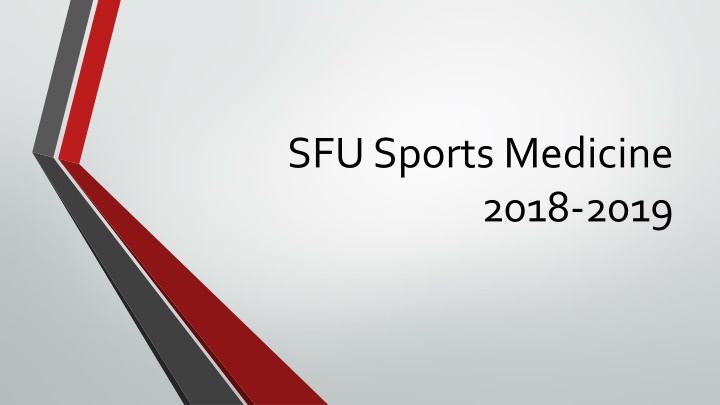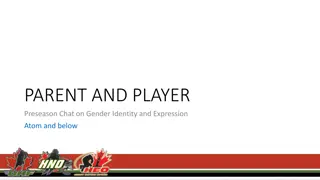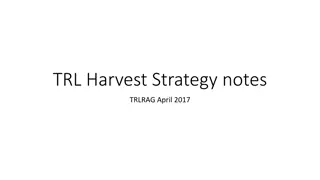
Concussions in Sports Medicine
Explore the world of sports medicine and learn about concussions - a type of traumatic brain injury that affects mental function, balance, and more. Discover the signs, symptoms, causes, and what to do when concussion occurs.
Download Presentation

Please find below an Image/Link to download the presentation.
The content on the website is provided AS IS for your information and personal use only. It may not be sold, licensed, or shared on other websites without obtaining consent from the author. If you encounter any issues during the download, it is possible that the publisher has removed the file from their server.
You are allowed to download the files provided on this website for personal or commercial use, subject to the condition that they are used lawfully. All files are the property of their respective owners.
The content on the website is provided AS IS for your information and personal use only. It may not be sold, licensed, or shared on other websites without obtaining consent from the author.
E N D
Presentation Transcript
SFU Sports Medicine 2018-2019
Sports Medicine Staff Team Physicians (University Orthopedics) Athletic Training Staff: Terry Bennett (Director; Football, Golf) Spencer Luciano (Men s Soccer, Softball & Bowling) Rich Bertie (Women s Soccer, Men s Basketball & Cheer) Jenna Hirsch (Women s & Men s Volleyball, Swimming, Water Polo) Ryan McGovern (Assistant Football, Lscrosse & Tennis) Brookke Mahaffey (Field Hockey, Women s Basketball, Track & XC) SFU SPMED IS HERE FOR EVERYONE!!!!
Medical Records ATS (Electronic Medical Records) Every Student Athlete must register!
St. Francis University Sports Medicine Student Athlete Concussion Education Program
What is a Concussion? A concussion is a type of traumatic brain injury (TBI) It follows a force to the head or body and leads to a change in brain function Direct or Indirect Result: impairment of mental function such as memory, balance/equilibrium, and vision Loss of consciousness may occur
Signs and Symptoms Don t feel right Difficulty concentrating Difficulty remembering Fatigue Confusion Drowsiness Trouble sleeping More Emotional Irritable Sadness Anxiety Headache Pressure in head Nausea Vomiting Blurred vision Balance problems Sensitivity to light Sensitivity to sound Feeling slowed down Feeling mentally foggy
How Concussions Occur Direct Blow to the head Collision /Headers Hit by object Indirect blow Rotational force Hit head off the ground (brain accelerates and decelerates quickly) Not all concussions are sport related Car accident Slip and fall
What to Do? Immediately report symptoms to athletic training staff Inform coaches if ATC is not present DO NOT HIDE SYMPTOMS!!
What happens next? Follow up with DiSepio Impact Neurocom Meet with Dr. Burke Return to play protocol (5 step) Re-test Clearance
While Recovering Avoid increasing your heart rate Avoid physical activity Limit cell phone use, TV, video games, computer screens Avoid any activity that can lead to head trauma Follow the protocol Rest!
Prevention Do not initiate contact with head Avoid striking an opponent in the head Follow the rules of the game Practice good form
Dangers Second Impact Syndrome When an individual sustains a second concussion before completely healing from a previous concussion 50% mortality rate Decreased decision making ability Early onset dementia Early onset Alzheimer s Permanent brain damage
St. Francis University Sports Medicine Mental Health & Disordered Eating Policies and Procedures Overview
On-Campus Resources Counseling Center Office Location: 120 Francis Hall Phone: 814-472-3211 Office Hours: Mon-Fri, 8 am-4 pm (evening hours by appointment) counseling@francis.edu
Warning Signs Mental Health Disordered Eating Talking about hurting self or wanting to die Feelings of hopelessness Increase in drug and alcohol usage Impulsive, anxious or irritated Changes in sleeping pattern Withdrawal from normal routine Isolation Extreme mood swings Giving personal items away Reports feeling fat/heavy despite low body weight. Intense fear of gaining weight Obsessions about weight, diet, or appearance Consistent excuses to avoid situations involving food Ritualistic eating behaviors Avoids social eating situations Food rituals e.g. eating foods in certain order or rearranging food on plate Obsession with exercise and may increase workouts secretly Binge eating and then disappears Evidence of purging behaviors Feeling of being out of control during binge eating episodes Denial of unhealthy eating pattern Angry when confronted with concerns Eventual decline in physical and school appearance
NCAA Compliance 101 Welcome Back Student-Athletes!
NCAA Ethical Conduct Must act with honesty and sportsmanship at all times so that you represent the honor and dignity of fair play. Must cooperate if required to participate in an NCAA investigation.
Sports Wagering Student-athletes are not permitted to be involved in any sport-related gambling. The NCAA defines a wager as giving up something up value (money, jersey, dinner) in exchange for the possibility of gaining another item of value. Impermissible sports wagering activities include fantasy football leagues, March Madness bracket pools, and Super Bowl box pools IF a wager is involved. Student-athletes should also make sure to not disclose any private information (such as injuries) to unknown parties who could use that information in gambling activities.
Amateurism All NCAA student-athletes must maintain amateur status in his/her sport in order to participate. Any agreement with an agent (verbal or in writing) or accepting any benefit from an agent will automatically render you ineligible in all NCAA sports. Any prize money and/or payment received for participating in your sport cannot exceed your actual and necessary expenses to participate (lodging, meals, transportation, registration fees, etc.).
Student-Athlete Endorsements As a student-athlete, you are not permitted to endorse or promote any commercial product or service with your name, image or likeness. An endorsement can include a tweet or Instagram post.
Five-Year Eligibility Clock At the Division I level, you have 5 years to use your 4 seasons of competition eligibility. Your eligibility clock begins the moment you enroll as a full-time student at any collegiate institution (JUCO, Community College, Technical College, 4- Year College). Your eligibility clock does not stop if you decide to take a semester off or are enrolled less than full-time. Your eligibility clock will only stop for military service, peace corps work or an official religious mission trip. You can only receive an extension of your 5-year clock if you miss two or more seasons of competition in your sport due to circumstances beyond your control (injuries, financial issues, family issues, coach s decision to redshirt during freshman year).
Seasons of Competition Your 4 seasons of competition can only be used within your 5-year eligibility clock. ANY amount of competition (one second, one play, one pitch, etc.) uses a season of competition. FOOTBALL ONLY: Football student-athletes can participate in up to four competitions without using a season of competition. Competition during your nonchampionship season does not use a season of competition in the following sports: Fall Nonchampionship Sports: Women s Lacrosse, Softball, Men s Volleyball, Women s Water Polo Spring Nonchampionship Sports: Field Hockey, Men s Soccer, Women s Soccer, Women s Volleyball
Medical Hardships If you suffer a season ending injury or illness, it is possible to get back that season of competition if the following requirements are met: Your injury/illness occurs within the first half of your season. You participated in less than three contests/dates of competition or 30% of your team s scheduled contests/dates of competition (whichever is greater). The injury/illness must be season-ending. The Compliance office, in conjunction with your Athletic Trainer, will automatically file your Medical Hardship Waiver with the Northeast Conference office.
Extra Benefits An extra benefit is any special arrangement provided to a student-athlete and/or a student-athlete s friends/family which is not permitted by NCAA legislation and is not generally available to another group of individuals (such as all SFU students). Examples include: Use of a coach s car Regular transportation from a staff member A free meal from a fan of SFU Athletics Free or reduced cost lodging Discounts on store merchandise only available to student-athletes
Recruiting of Prospective Student-Athletes Student Hosts for Official and Unofficial Visits Permitted to receive up to $40 per day (maximum of $80) for entertainment of a recruit during an official visit only. Money cannot be used for any tangible item (T-shirt, hat, etc.) and all entertainment must be within 30-miles of campus. Host money will be picked up from the Compliance office. You are permitted to be friends with recruits on social media and interact with recruits as long as a coach or staff member does not instruct you to do so.
Financial Aid If your athletic scholarship is reduced or cancelled you are permitted the right to appeal that decision. Steps on how to appeal will be sent to you via the Office of Financial Aid. If you notify SFU of your intent to transfer your athletic scholarship can be reduced or cancelled beginning with the next full-time semester.
Notification of Transfer If you intend to transfer (or wish to talk with other coaches), you will need to send an e-mail to myself (stay@francis.edu). The Compliance office will add your information to the National Transfer Database within two business days. Your current coach cannot place any restrictions on the institutions you can communicate with. Once you submit your notification of transfer, your coach can decide to cancel your athletics scholarship beginning with the following semester.
Notification of Transfer Please note, in order to be eligible for competition at your next institution (if you decide to transfer) your current coach must still grant you the use of the One-Time Transfer Exception for all sports except Basketball and Football (transferring to another scholarship FCS or FBS institution). If your coach denies your use of the One-Time Transfer Exception, you will be provided with instructions on how to appeal that decision by the Compliance office. If you transfer without being granted use of the One-Time Transfer Exception, you can practice and receive an athletics scholarship but cannot compete for one academic year (two full-time semesters).
Employment Student-athletes are permitted to secure employment at any time as long as: You are paid for work you are actually performing; You are paid the going rate for your position; and The organization you are working for does not use your name, image, likeness or status as a SFU student-athlete to promote the business. You are required to notify the Compliance office any time you start a new job. You are permitted to be employed at a Saint Francis or another organization s camp/clinic as long as you are not employed only as a demonstrator/lecturer. If you are interested in conducting private lessons as a form of employment, please stop by the Compliance office to discuss the various NCAA requirements related to private lessons.
Initial Eligibility (Incoming Freshmen Only) Must be deemed a Final Qualifier and an amateur student-athlete by the NCAA Eligibility Center in order to compete in your freshmen year. All required documents (high school transcripts, SAT/ACT test scores) must be received by the NCAA Eligibility Center before you will be permitted to practice with your team.
Continuing Eligibility In order to remain eligible for competition after your freshmen year you must complete the following: 24 credit hours before the start of your 2ndyear (Fall, Spring and Summer). 18 credit hours each academic year (Fall and Spring only). 6 credit hours each semester (9 credit hours in the Fall semester for Football student- athletes only). Declare a major by the start of your 3rdyear. Remain enrolled full-time (unless you are in your final semester).
Progress-Towards-Degree All student-athletes must also remain on track to graduate within 5 years in order to remain eligible. By the beginning of your 2ndyear: 1.800 GPA and 24 credits completed. By the beginning of your 3rdyear: 1.900 GPA and 40% of your degree credits completed. By the beginning of your 4thyear: 2.000 GPA and 60% of your degree credits completed. By the beginning of your 5thyear: 2.000 GPA and 80% of your degree credits completed.
NCAA Drug Testing Street Drugs Marijuana, heroin, cocaine, etc. Positive test results in 50% suspension from competition during your next season. Can be tested at any time. Missed test counts as a positive test. Performance Enhancing Drugs Positive test results in an immediate 365-day suspension from competition. Charged with one season of competition. Must submit a clean test following 365-day suspension before you can be reinstated. Second positive test results in permanent ineligibility. Can be tested at any time. Missed test counts as a positive test.
Practice Hours In-Season 20 hours per week maximum 4 hours per day maximum Minimum of 1 day off per week Activities that count towards these limits include: Conditioning and Strength Training Team Meetings/Film Review Practice/Skill Instruction Competition Individual workouts with coaches (including voluntary workouts) Travel does not count and a travel day can be used as a day off. Out-of-Season 8 hours per week maximum No daily limit Minimum of 2 days off per week Only the following activities can occur out-of-season: Conditioning and Strength Training Skill Instruction (no more than four hours per week) Team Meetings Film review and/or Walk-Throughs (Football Only) Conditioning/strength training workouts cannot use equipment related to your sport or mimic offensive/defensive plays and/or formations.
Complimentary Admissions Football and Basketball Student-Athletes Only: Can request up to four complimentary admissions for home or away contests in your sport through the JumpForward Comp Tickets tab. You must create a guest profile within JumpForward for each individual you would like to assign tickets to throughout your season. You can transfer your complimentary admissions to a teammate if you will not be using all four. All Student-Athletes: You can receive up to six complimentary admissions for any conference or NCAA tournament contest in which you are participating. Will be requested in writing.
Important Reminders You MUST remain enrolled full-time (12 credit hours) unless otherwise approved. Check you SFU e-mail account daily. Sign off on any practice logs and/or forms assigned to you via JumpForward in a timely manner. Highly recommended to download the JumpForward app (available on iOS and Android) to sign off on practice logs/complete required forms on your phone. If you ever have a question regarding NCAA rules or need to report a potential violation please feel free to stop by the Compliance office at any time!






















